President-elect Donald Trump and his top political and security advisers are convinced Islam’s moral rules, the sharia, not only imperil the safety of Americans but their very way of life, writes Will McCants. That view could ultimately serve as a boon to jihadist recruitment. This piece originally appeared in the Washington Post.
President-elect Donald Trump and his top political and security advisers are convinced Islam’s moral rules, the sharia, not only imperil the safety of Americans but their very way of life. They break sharply with Presidents Obama and George W. Bush who refused to equate traditional Islam with terrorism. The rupture view could ultimately serve as a boon to jihadist recruitment.
The president-elect has called for an “ideological screening test” for immigrants “who believe that sharia law should supplant American law.” His chief political strategist, Steve Bannon, has said that the Roman Catholic Church and the “Judeo-Christian West” have to “struggle against Islam” just as their ancestors did. He is reportedly taking advice from the notorious sharia conspiracy theorist Frank Gaffney, whose team briefed Trump on the dangers of sharia during the campaign.
Trump’s national security adviser, Michael Flynn, called Islam a “cancer” and a “political ideology” that “hides behind this notion of it being a religion.” (Flynn regularly promotes false stories of sharia law taking over in the United States.) And Trump’s nominee for the nation’s chief law enforcement officer, Sen. Jeff Sessions, has said that the true threat confronting the United States is “the toxic ideology of Islam” and has proposed screening out immigrants who “believe in sharia law.”
Suspicion of sharia is not confined to Trump and his advisers. It permeates mainstream Republican politics. More than half of Fox viewers believe American Muslims want to impose sharia. Former House Speaker Newt Gingrich, a front-runner in the previous election cycle, described sharia as “a mortal threat to the survival of freedom in the United States and in the world as we know it.” (He upped the ante during Trump’s campaign, calling for deporting every Muslim citizen who believes in it.)
The content of the sharia alone cannot explain fears of it. Many of its controversial rules, like death for blasphemy and apostasy, have parallels in the Hebrew Bible, a book revered by many Americans. Most Muslim countries to do not impose the sharia in total—they either limit its application to family law or ignore it entirely. And most of the 1 percent of Americans who are Muslim believe the sharia is just ethical personal guidelines that should not supersede the Constitution—even according to the crudest online polls promulgated by the right. Like any faith community in the United States, American Muslims can practice the sharia as long as it does not violate American law.
So whence the worry? It arises from deeper fears of physical and cultural death. The physical fear is a consequence of the 9/11 attacks, which deeply scarred the psyche of a nation that is not used to war on its soil. The attacks shattered Americans’ sense of security and invulnerability. Because the attackers justified their atrocity on the basis of Islamic scripture, the religion and its adherents became objects of suspicion blame—never mind that the kind of sharia jihadists want is not the kind most American Muslims want.
That paranoia has grown following a series of lone wolf attacks claimed by the so-called Islamic State: San Bernardino, Orlando, St. Cloud. In some ways the fear is worse now than after 9/11 because the attacks are carried about by Americans acting on their own and not by foreigners directed by an organization. When I was promoting my book on ISIS in small towns, I was stunned to hear audience members expressing their terror that their local mall or Walmart could be next. If it can happen in San Bernardino, it can happen here, they suggested.
The paranoia is stoked by jihadist organizations like the Islamic State, who claim attacks in its name even if the attacker has no connection to the organization. It wants non-Muslims to distrust their Muslims neighbors, hoping they will become alienated and more susceptible to recruitment. Even lone-wolf attackers deliberately foster distrust. “Btw, every single Muslim who disapproves of my actions is a sleeper cell, waiting for a signal,” wrote the Ohio State attacker on Facebook.
That the Ohio State attacker was a refugee from Somalia plays into the related fear that immigrants from non-Western countries are a threat to the American way of life, especially immigrants from Muslim-majority countries. Notice that condemnations of sharia as a security threat almost always accompany peaens to America’s Judeo-Christian heritage. The sharia is presented as the inverse of everything America stands for—the shadow that offsets the light.
The distant fathers of American law, the Romans, would have empathized with this strain of America’s cultural anxiety. In their day, the Roman elite worried about Jewish law subverting Roman culture, including those who were particularly concerned about Romans who converted to Judaism. The senator Tacitus scorned “those who come over to their religion adopt the practice, and have this lesson first instilled into them, to despise all gods, to disown their country, and set at nought parents, children, and brethren.”
The fear of Jews, which a historian of the ancient world dubbed Judeophobia, continued on in the Christian empires that replaced Rome for many of the same reasons. Jews were deemed a people apart, worshiping a law that God had annulled when he sent his only begotten son. “I advise that their rabbis be forbidden to teach henceforth on pain of loss of life and limb,” Martin Luther wrote, because “they wantonly employ the poor people’s obedience contrary to the law of the Lord.”
There was some anti-Semitism in early American history, but there weren’t enough Jews in America to worry about until the mid-19th century when Jewish immigration began to sharply increase. Because Jews were associated with international banking in the public imagination, they were blamed for the financial downturns in the late nineteenth century that triggered spasms of populist rage.
When global anti-Semitism reached a fevered pitch in the run-up to World War II, Christians and Jews combated it together by portraying Judaism as part of a common American patrimony. To that era we owe the phrase, “Judeo-Christian heritage.” The national guilt for failing to protect the Jews from the Holocaust forever enshrined the phrase in the America’s political lexicon.
Jews are again the target of populist rage in the United States. Hundreds of journalists received anti-Semitic death threats on Twitter during the election. But to those who consider minority faiths to be a threat, Jews have been eclipsed by Muslims, who, in the popular imagination, threaten to destroy the white Christian West physically with terrorism and immigration and culturally with alien laws.
The legal measures proposed in response, like banning veils and creating a registry, do not have a good track record. Restricting Muslims’ religious freedoms has resulted in more jihadist terrorism in Europe, not less. And a registry conjures Europe’s darkest moment of the last century.
Demonizing and repressing a religious minority because it has different moral rules than the majority can have unintended consequences.
A classically American approach that protects the many religious streams running together to form the American cultural heritage rather than damming one in favor of another. As historian Denise Spellberg observes of Thomas Jefferson’s view of Islam, “In the formation of the American ideal and principles of what we consider to be exceptional American values, Muslims were, at the beginning, the litmus test for whether the reach of American constitutional principles would include every believer, every kind, or not.” Jefferson didn’t care for Islam (or any organized religion, for that matter). But he understood that America would be stronger if citizens favoring one stream of its heritage vigorously argued its merits without seeking to place legal limits on those arguing for the merits of a different stream.
In the short term, Jefferson’s approach will not alleviate the fear behind the laws contemplated by Trump and his team. But by refusing to put unfair restrictions on Muslims, we rebuff the jihadist recruiters and ensure that our roiling cultural heritage, energized by passionate debate, can continue to adapt to the ever-changing demographic landscape.
Demonizing and repressing a religious minority because it has different moral rules than the majority can have unintended consequences. Just ask the pagan Romans who scorned Jews because of their religious laws. Some of those Jews reacted by changing how they practiced their religion, arguing that one could be faithful to the spirit of Judaism without obeying Jewish law and faithful to Roman law without disobeying God. The change made it easier for those Jews—known as Christians—to proselytize among the Gentiles, which ultimately paved the way for their takeover of the empire. Presumably that’s not the outcome Trump and his advisers have in mind for the restrictions they are contemplating.
The Brookings Institution is committed to quality, independence, and impact.
We are supported by a diverse array of funders. In line with our values and policies, each Brookings publication represents the sole views of its author(s).

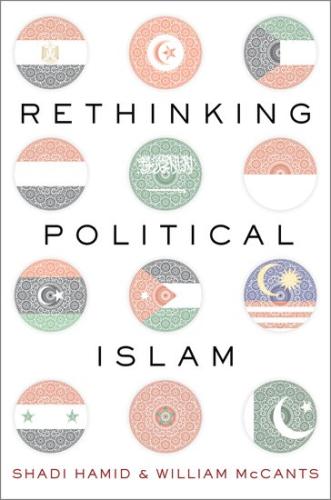
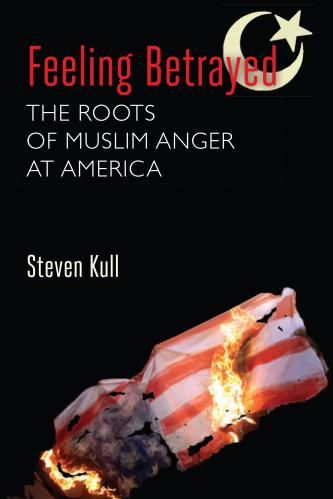
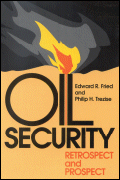
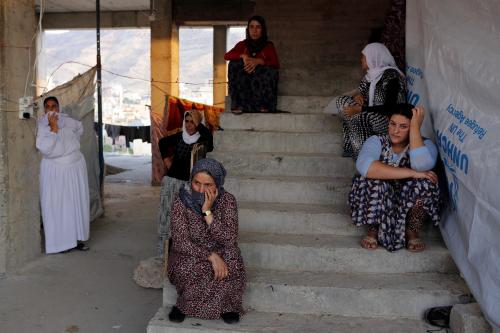
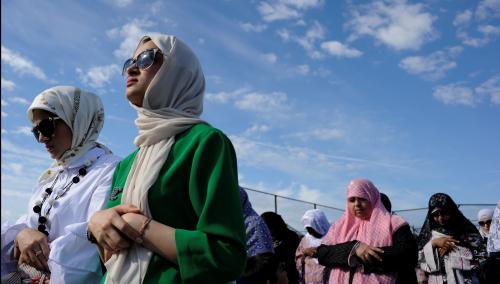





Commentary
The implications of Donald Trump’s sharp contrast from Obama and Bush on Islam
December 15, 2016